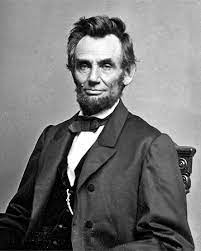
Humble Beginnings:
Imagine a small log cabin in Kentucky where Abraham Lincoln was born in 1809. His childhood wasn’t the stuff of dreams – his family struggled with poverty, and formal education was a luxury. Life on the rough frontier carved the early chapters of his story.
Growing up, Lincoln did his best to help the family. He did various odd jobs, from splitting rails to working as a store clerk. It was a life of hard work and little comfort, yet it laid the foundation for the man who would become one of America’s greatest leaders.
Trying Business Ventures:
As Lincoln entered adulthood, he ventured into business – running a store and trying his hand at law. Unfortunately, these ventures faced a rocky road. Economic downturns hit hard, and Lincoln found himself drowning in debt. The failure of his businesses brought financial ruin, a harsh reality that he confronted with resilience.
Political Dreams and Setbacks:
Driven by a passion for change, Lincoln entered the world of politics. However, the path to political success was far from smooth. He faced defeat in elections for the Illinois State Legislature, the U.S. Congress, and the U.S. Senate. Each rejection stung, but Lincoln refused to let it define him. His political dreams persisted, fueled by a vision of a better future.
Personal Struggles:
Life wasn’t just challenging in the professional realm. Lincoln’s personal life bore its share of struggles. The passing of his young son, Eddie, in 1850, and the mental health challenges his wife, Mary Todd Lincoln, faced added layers of difficulty to his journey. Yet, in the face of personal sorrow, Lincoln’s determination remained unwavering.
Turning Point: Becoming President:
In 1860, against all odds, Lincoln secured the Republican nomination for the presidency. His journey from a log cabin in Kentucky to the national stage marked a turning point. The nation was at a crossroads, and Lincoln was now tasked with navigating it through turbulent times.
Presidential Journey and Key Decisions:
As the 16th President of the United States, Lincoln faced the monumental challenge of leading a divided nation during the Civil War. His leadership was tested on multiple fronts – political, military, and moral.
Key Decision: Emancipation Proclamation (1863): A pivotal moment in Lincoln’s presidency was the issuance of the Emancipation Proclamation in 1863. This executive order declared all slaves in Confederate-held territory free. While it didn’t instantly free all slaves, it shifted the narrative of the Civil War, making it a fight not just to preserve the Union but to end slavery.
Lincoln’s decision to issue the Emancipation Proclamation showcased his moral commitment and strategic thinking. It was a bold move that altered the course of the war and had far-reaching consequences for the nation’s future.
Legacy Lives On:
Lincoln’s presidency was tragically cut short by an assassin’s bullet in 1865, but his legacy endures. The man who faced humble beginnings, political defeats, and the challenges of leading a nation through war is remembered as a symbol of resilience, moral courage, and the pursuit of justice.
- Roots in Hardship:
- Lincoln’s humble beginnings instilled in him a work ethic and resilience that defined his character.
- Entrepreneurial Spirit:
- The failure of his business ventures didn’t deter Lincoln; instead, it fueled his determination to create change.
- Political Perseverance:
- The string of electoral defeats didn’t crush his political dreams; instead, they shaped his resilience and resolve.
- Personal Grit:
- Facing personal sorrow, Lincoln’s determination remained a constant force in his journey.
- Presidential Challenges:
- Leading during the Civil War tested Lincoln’s leadership on all fronts – political, military, and moral.
- Key Decision – Emancipation Proclamation:
- The decision to issue the Emancipation Proclamation showcased Lincoln’s commitment to justice and his strategic thinking.
- Legacy Beyond Time:
- Even though his life was cut short, Lincoln’s impact continues to shape the ideals of resilience, moral courage, and justice.